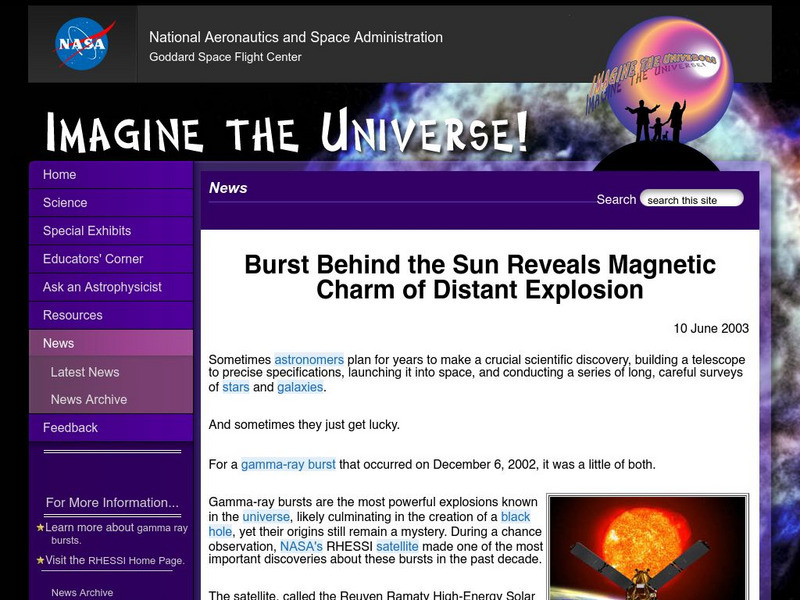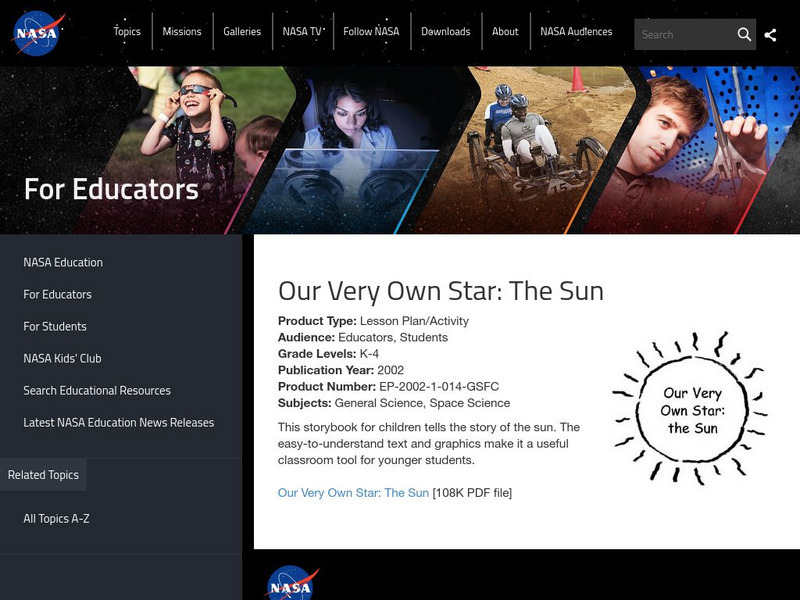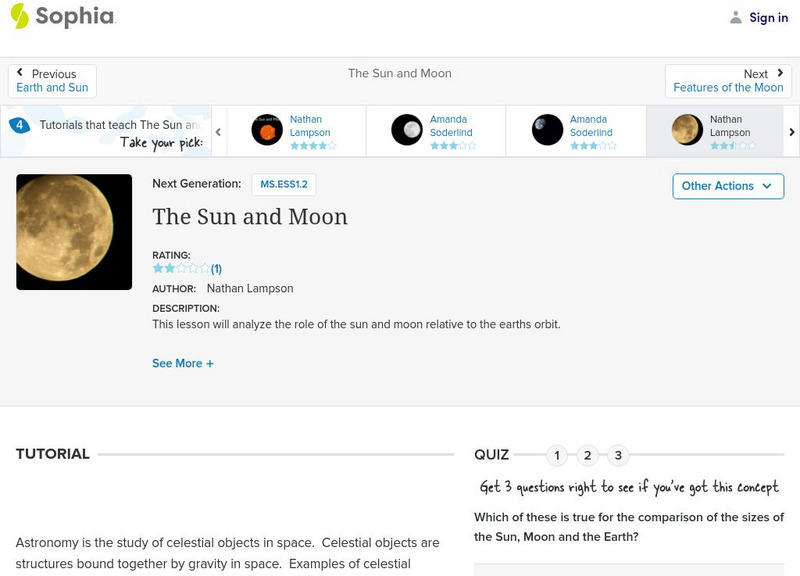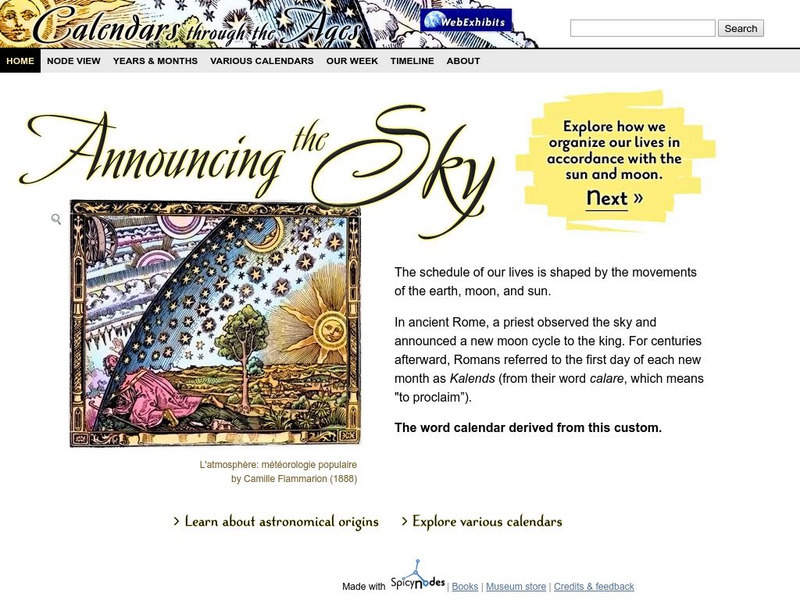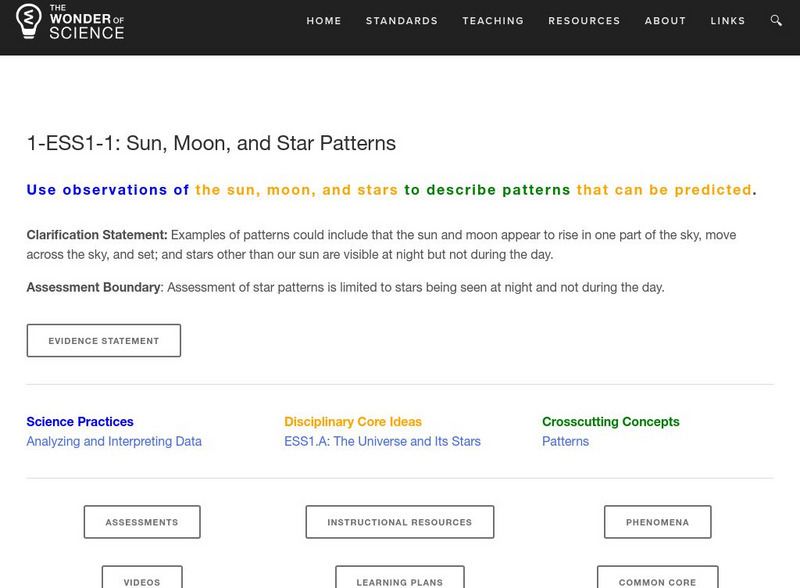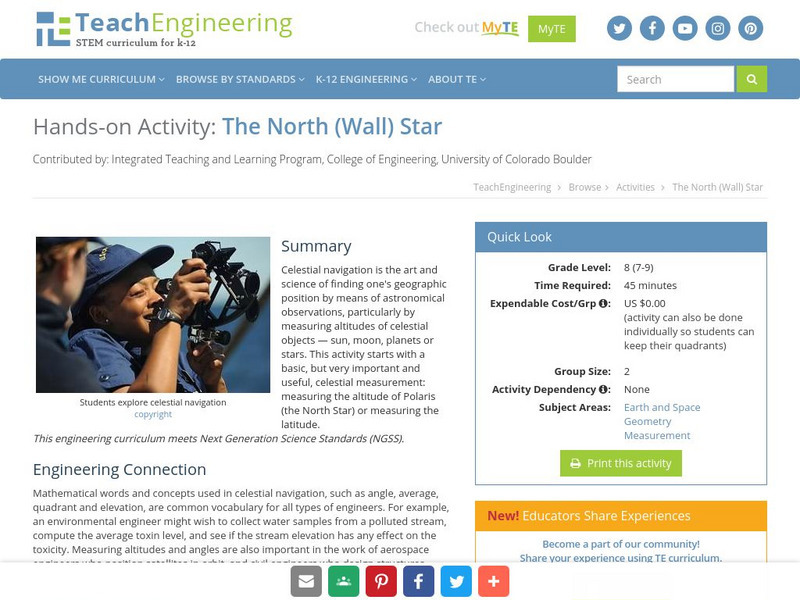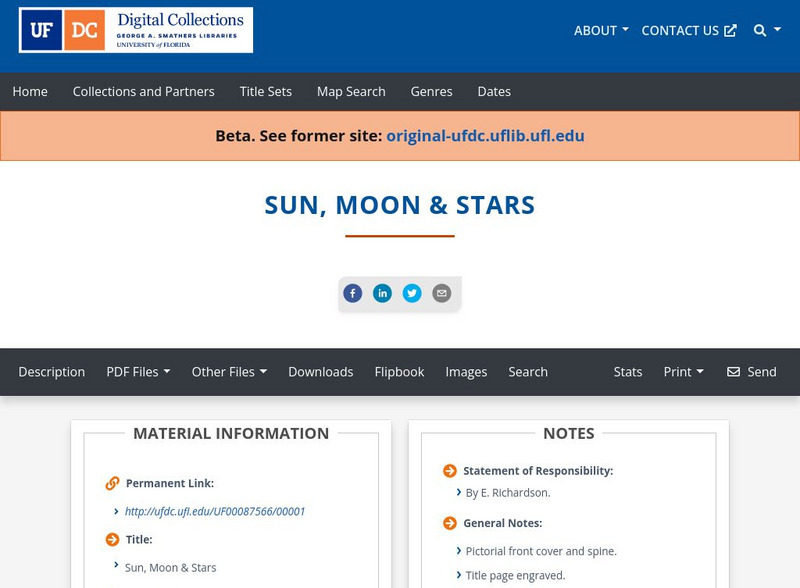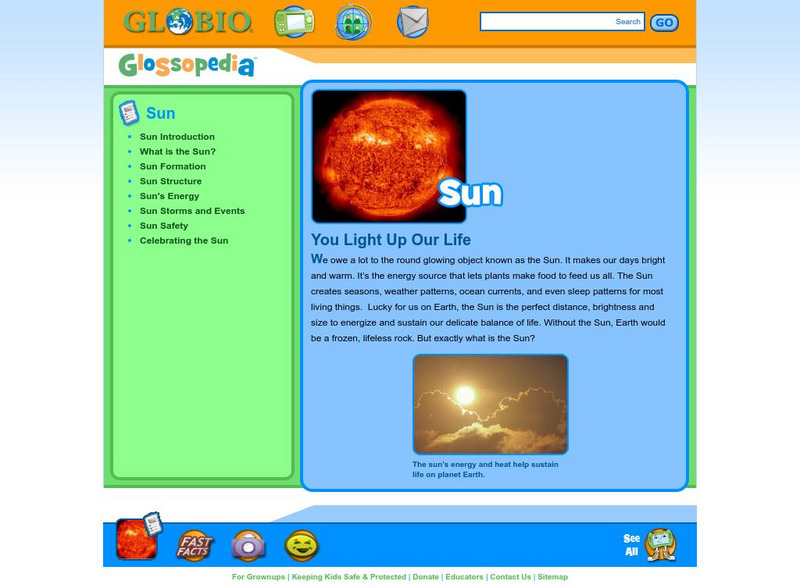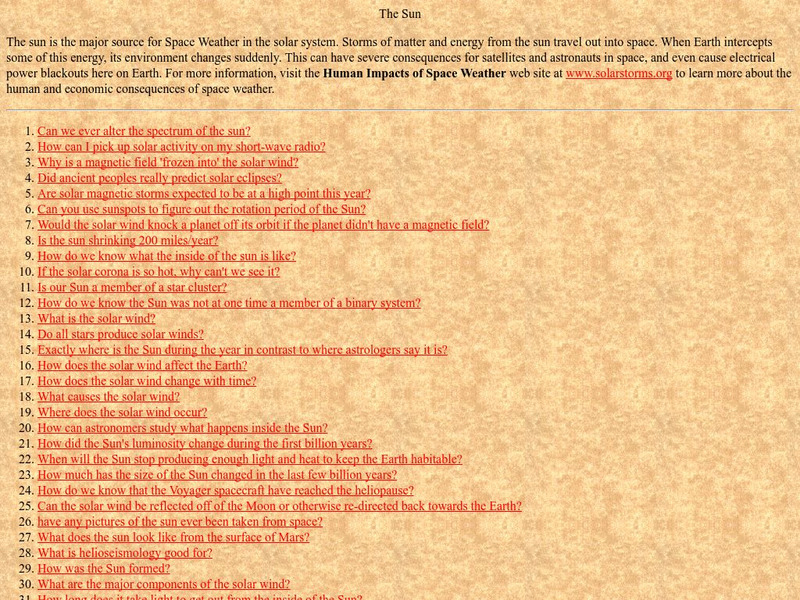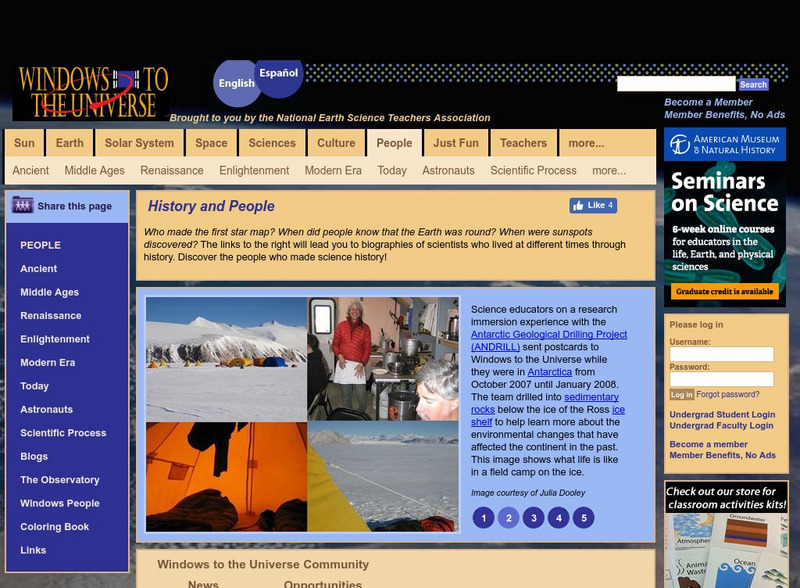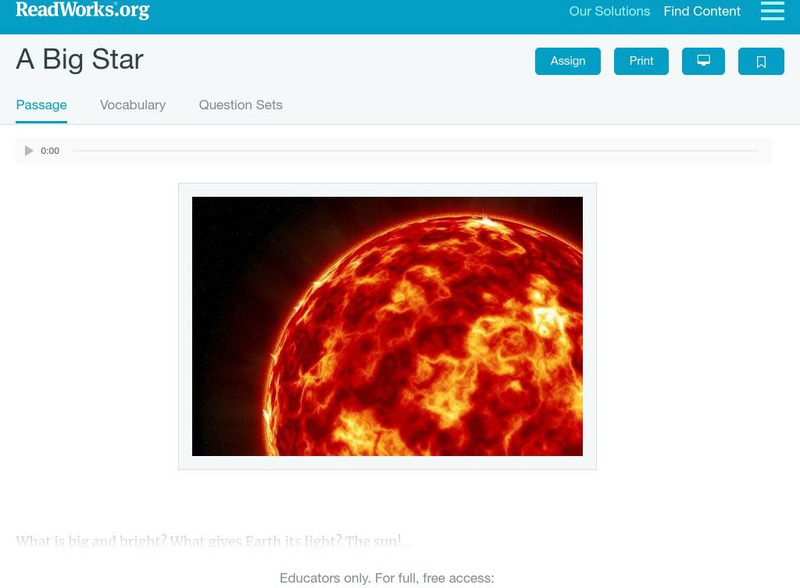Hi, what do you want to do?
NASA
Nasa: Imagine the Universe: "Burst Behind the Sun"
Site provides the article, "Burst Behind the Sun Reveals Magnetic Charm of Distant Explosion," that details on a gamma-ray burst that occurred on December 6, 2002. Provides graphics and links to learn more about gamma-ray bursts.
NASA
Nasa: Classroom Activity: Our Very Own Star: The Sun
This PDF storybook for children tells the story of the sun. The easy-to-understand text and graphics make it a useful classroom tool for younger students.
Nine Planets
The Eight Planets: The Sun Solar Wind
This Eight Planets site briefly describes solar wind, a low density stream of charged particles emitted by the Sun. It also provides the basics on the sun's composition and additional sun links.
PBS
Pbs Learning Media: Sky Patterns: Sun, Moon, and Stars
Observe the regular, predictable patterns of the Sun, Moon, and stars in the sky in this media gallery from WGBH. Interact with the animated storybook to observe and predict patterns of the Sun, Moon, and stars over a day and analyze...
PBS
Pbs Learning Media: Sun, Moon, and Star Patterns in the Sky: Lesson Plan
Observe how the Sun, Moon, and stars are visible in the sky at different times of the day and identify predictable patterns in the apparent motion of these objects with this WGBH lesson plan. Students record and analyze data to identify...
Sophia Learning
Sophia: The Sun and Moon: Lesson 3
This lesson will analyze the role of the sun and moon relative to the earth's orbit. It is 3 of 4 in the series titled "The Sun and Moon."
Sophia Learning
Sophia: The Sun and Moon: Lesson 4
This lesson will analyze the role of the sun and moon relative to the earth's orbit. It is 4 of 4 in the series titled "The Sun and Moon."
Institute for Dynamic Educational Advancement
Web Exhibits: Calendars Through the Ages: Announcing the Sky
Well-organized website depicts the "Fascinating history of the human endeavor to organize our lives in accordance with the sun and stars." Gives an overview and specifics of the basis of calendars through the ages.
The Wonder of Science
The Wonder of Science: 1 Ess1 1: Sun, Moon, and Star Patterns
The NSTA vetted source includes resources to help students describe patterns of the sun, moon, and stars using observation. Included are assessment ideas, videos, examples, lesson plans, and photos of student work.
TeachEngineering
Teach Engineering: The North (Wall) Star
Celestial navigation is the art and science of finding one's geographic position by means of astronomical observations, particularly by measuring altitudes of celestial objects - sun, moon, planets or stars. This activity starts with a...
University Corporation for Atmospheric Research
Ucar: The Sun
Learn about the sun, the center of our solar system and the closest star to Earth.
NASA
Nasa Star Child: The Sun
Get to know our nearest star with this introduction to the sun. Listen to the information in an audio file. Vocabulary words are linked to a glossary of terms. Features include links to other interesting facts and a printable version of...
University of Florida
Baldwin Library: Sun, Moon and Stars
A scanned copy of the 1899 publication of Sun, Moon and Stars by E. Richardson, a book of children's poetry.
NASA
Nasa: Imagine the Universe: The Sun
Site discusses the regions of the Sun's atmosphere such as the Photosphere, Chromosphere, and Corona. Provides sources for educators as well as additional links for students.
Science Education Resource Center at Carleton College
Serc: Calculating the Declination of the Sun for Elementary Students
In the school courtyard, students will measure the apparent path of the sun across the sky using a toilet plunger. Students will then generate questions as to why the sun appears to move, and what is really happening in the process. We...
Globio
Glossopedia: Sun
We owe a lot to the round glowing object known as the Sun. It makes our days bright and warm. It's the energy source that lets plants make food to feed us all.
Enchanted Learning
Enchanted Learning: Zoom Astronomy: All About Space
A fantastic collection of information about the solar system. Includes information on all of the planets, the moon, the sun, asteroids, comets, meteoroids, and stars. Also find puzzles, a dictionary, quizzes, classroom activities, and...
NASA
Nasa: Image Science Center: Ask the Space Scientist
A NASA space scientist provides 98 questions and answers about the sun, the center of our solar system.
Other
An Atlas of the Universe
What does the universe look like? This website offers visitors a collection of images that serve as an "atlas" of our universe. See multiple charts showing the Earth's distance from the Sun and other stars, find helpful terms in a...
PBS
Pbs Learning Media: Changes in the Sky: Interactive Lesson
Explore real-life and animated views illustrating the daily patterns of motion of the Sun, Moon, and stars in the sky. Students engage with a variety of media such as an interactive storybook, time-lapse videos, and images to identify...
Utah Education Network
Uen: The Night Sky
Learn about the rotation of the earth, the movement of the moon, and the position of the sun.
National Earth Science Teachers Association
Windows to the Universe: History & People
Biographies of people throughout history who looked at the sky and wondered what was there. Links to a detailed description of the planets and interactive activities.
Read Works
Read Works: A Big Star
[Free Registration/Login Required] This reading passage is about the sun including what it is and what it does for the earth. It if followed by reading comprehension questions based on Common Core standards.
PBS
Pbs News Hour Extra: Satellites Orbit the Sun to Better Predict Solar Storms
For the first time, NASA scientists have generated a full image of the sun, front and back, using twin orbiting satellites. The new view of Earth's star will allow for the study of solar weather events like coronal mass ejections that...





